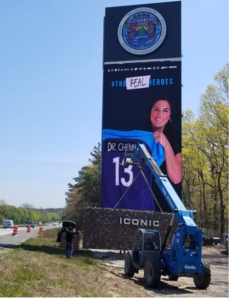
- Details
- By Levi Rickert
SHINNECOCK NATION — The Shinnecock Indian Nation got a victory in New York state Supreme Court in its fight to keep its electronic billboard, built on a right-of-way along Sunrise Highway on Long Island.
On Monday, Judge Sanford Neil Berland denied the state of New York’s request for a preliminary injunction to the Shinnecock Indian Nation’s billboard and monument on Sunrise Highway. The state of New York had been trying to force the tribe to take down the 61-feet electronic digital billboard, called the Shinnecock Indian Nation’s Monument Signs project. Located 90 miles from Manhattan, the Shinnecock Indian Nation serves at a gateway to the Hamptons with neighbors who live in posh mansions for the rich and famous.
The sign is the first of two that the tribe has planned in the area. The signs are a means of economic development for the tribe, generating advertising revenue for the Shinnecock Nation, which gained federal recognition in 2010. Unlike many other tribes in the northeastern U.S., the Shinnecock Nation does not have a tribal casino to generate revenue to fund the tribal government and services.
At the time the billboard was erected, the Shinnecock Indian Nation faced strong resistance from the adjacent town of Southampton, which served the tribal nation with a cease-and-desist order. The town said the Nation began building the billboard without the proper local permits. As a federally recognized tribe, the Shinnecock Nation maintained because it is a sovereign nation, it did not need to even apply for local permits.
The State of New York Dept. of Transportation soon became involved and sought an injunction to have the existing sign removed and prevent the construction of the second billboard sign.
On May 24, 2019, the New York State Attorney General’s Office brought a lawsuit against the officers of the Shinnecock Indian Nation, soon after the first sign was operational, but before the second sign could be completed.
Monday’s ruling dissolves a temporary restraining order issued when the lawsuit was brought last year.
“Our signs are clearly within the Shinnecock Territory Monument,” said the Shinnecock Nation Council of Trustees in a press release issued on Tuesday. “It is the Shinnecock Nation’s right to conduct economic development on Nation lands.”
Judge Berland rejected the merits of the State’s arguments that the Nation lacked jurisdiction over the land and that the sign itself posed a hazard to the broader community
“It’s a good day for the Shinnecock. I cannot say that about everyday, but today is definitely a good day for the Shinnecock,” Shinnecock Vice Chairman Lance Gumbs told Native News Online on Tuesday.
Gumbs said the tribe was excited with the rationale used by the judge in the ruling. In particular, Gumbs referred to Judge Berland’s explanation that “It is undisputed that the Shinnecock Nation’s ancestral domain encompassed essentially the entirety of what is now the Town of Southampton, and it has been established that the presence of the Nation in that domain has been continuous.”
Berland further determined that the signs “pose no unacceptable safety risk.” He stressed the greater importance of the Nation’s opportunity to produce revenue through economic activities on its own land, unencumbered by State interference, deciding that the balance of interests in this case favored the Tribe.
“The Shinnecock Indian Nation has continued to operate the Monument Billboard while the lawsuit was pending,” the Council of Trustees said. “Most recently, and at the request of the Town of Southampton, the Billboard has displayed public service announcements relating to the Covid-19 pandemic, providing safety information, and demonstrating its presence as a benefit, rather than hazard, to the surrounding community.”
With the lawsuit, Gumbs says some national advertisers have been reluctant to place advertisements on the billboard during the litigation. With Monday’s ruling, he is hopeful the concern will go away and the tribe can bring in more revenue.
More Stories Like This
American Basketball Association Announces Native ABA InitiativeFour Winds South Bend Upgrades to Class III Gaming Casino
Native News Online Wins Two Awards from Native American Journalists Association
Wahlberg Brothers Are a Big Hit at Indian Gaming Tradeshow and Convention in Las Vegas
Native Gro Offers Tribes a ‘One-Stop Shop’ for Entering the Cannabis Industry
Help us defend tribal sovereignty.
At Native News Online, our mission is rooted in telling the stories that strengthen sovereignty and uplift Indigenous voices — not just at year’s end, but every single day.
Because of your generosity last year, we were able to keep our reporters on the ground in tribal communities, at national gatherings and in the halls of Congress — covering the issues that matter most to Indian Country: sovereignty, culture, education, health and economic opportunity.
That support sustained us through a tough year in 2025. Now, as we look to the year ahead, we need your help right now to ensure warrior journalism remains strong — reporting that defends tribal sovereignty, amplifies Native truth, and holds power accountable.
 The stakes couldn't be higher. Your support keeps Native voices heard, Native stories told and Native sovereignty defended.
The stakes couldn't be higher. Your support keeps Native voices heard, Native stories told and Native sovereignty defended.
Stand with Warrior Journalism today.
Levi Rickert (Potawatomi), Editor & Publisher

